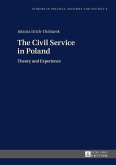Since the beginning of the 21st century, doctoral education has gained an increasingly important place on the reform agenda of higher education institutions and also at national and European policy levels. By paying particular attention to the characteristics and role of recently emerged Doctoral and Research Schools, this book examines on a broad empirical basis what this reform consists of in two small but scientifically and economically successful countries - Switzerland and Norway. This reform also raises the question to what extent power shifts take place regarding the doctoral process. Thus, does the «Thesis director» lose his or her power at the expense of other actors? Observed shifts are characterised through components of varying Public Management Narratives. In order to consider existing variety, case studies have been chosen on the basis of four variables - type of national political system, size and type of higher education institution and type of scientific discipline. This methodological framework allows not only illustrating variation in the reform process and its causes but also the development of a new University Governance Scheme.
Bitte wählen Sie Ihr Anliegen aus.
Rechnungen
Retourenschein anfordern
Bestellstatus
Storno








